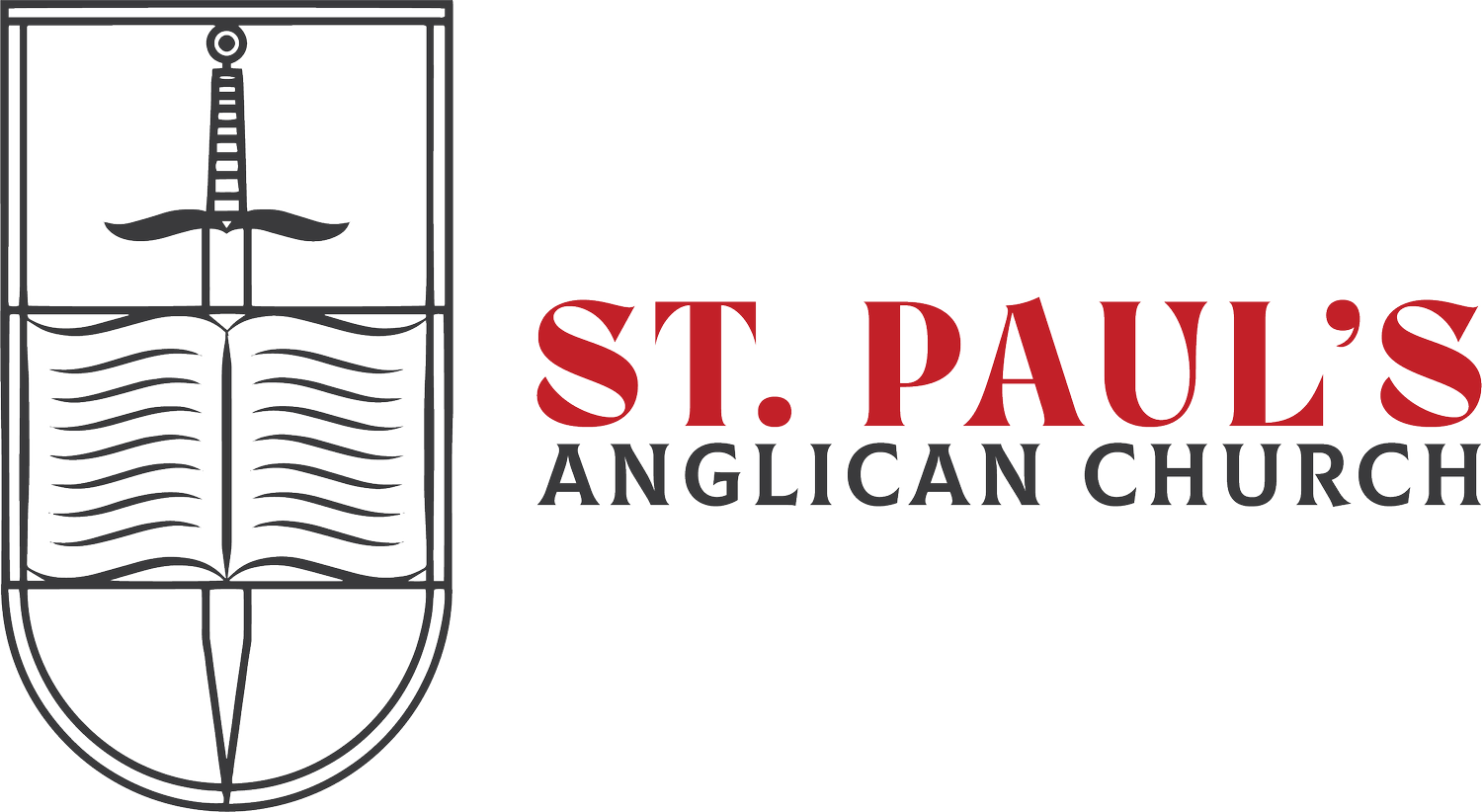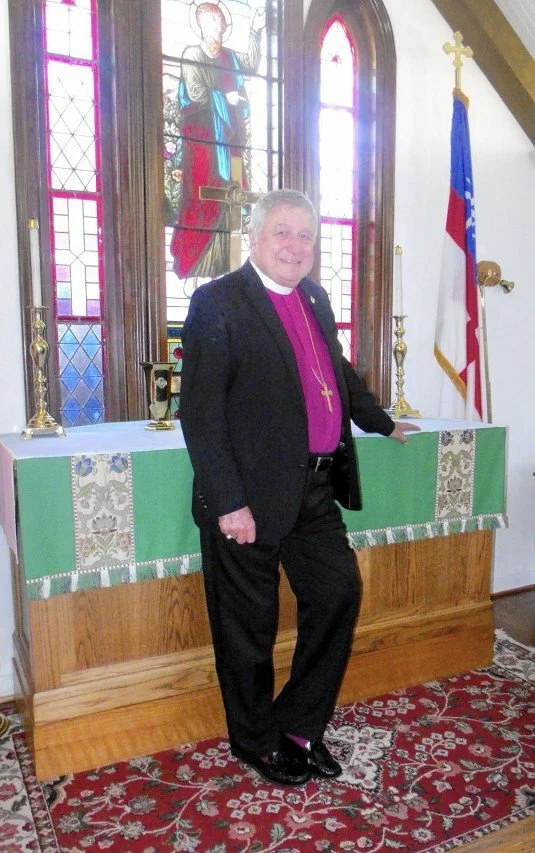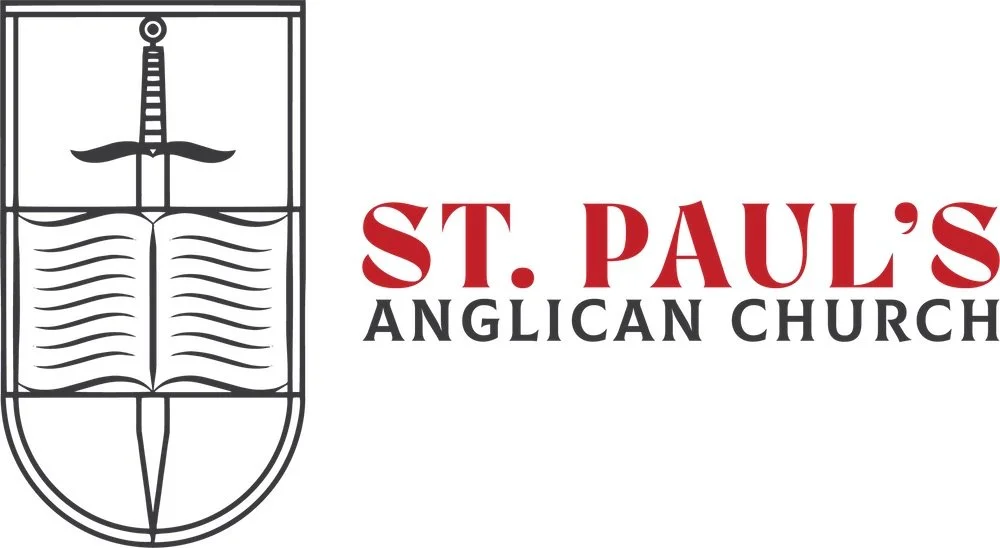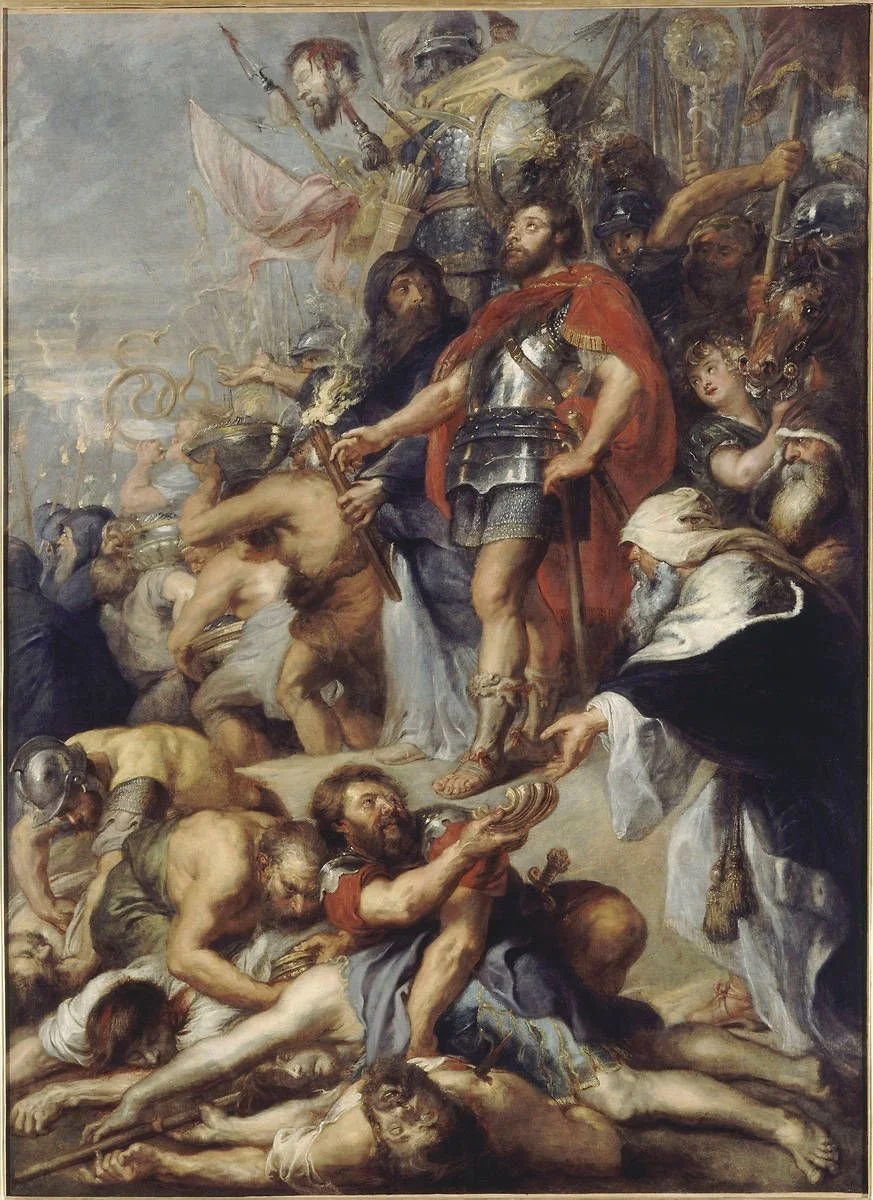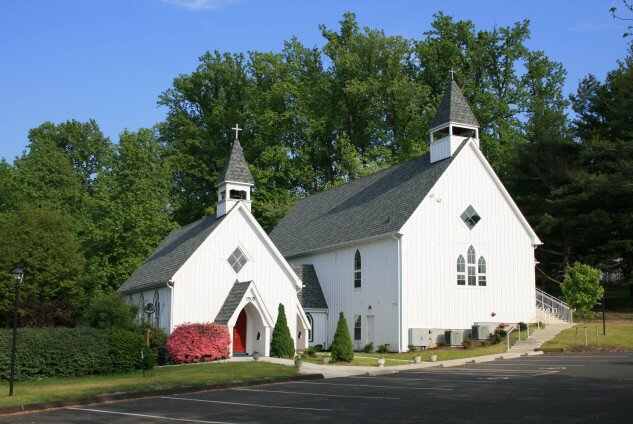
NEWS
The 2024 Missions Retreat in Dallas, Texas
This week, I had the privilege of going to the Montserrat Jesuit Retreat House in Dallas, Texas for a retreat on missions put on by Bp. Stephen Scarlett of the Diocese of the Holy Trinity in the Anglican Catholic Church. The week was marked by Morning and Evening Prayer and daily Eucharist. We had four main sessions at which Bp. Scarlett presented thoughts on how we do missions at the parish level and then we broke off into small groups to discuss various thought questions to further explore what he had taught us. The four sessions centered around praying for mission, forming the remnant, the ministry framework of spiritual direction, and hospitality as the central mode of mission.
The first talk the Bishop gave was about the importance of praying for mission. We cannot be effective at carrying out the Church’s mission at the parish level if we avoid prayer. Our rhythm should be to pray and wait for God to send us into a new ministry. Prayer cannot be seen as occasional or seasonal, but must be who we are. At Bp. Scarlett’s flourishing parish, St. Matthew’s in Newport Beach, CA, the Bishop requests that people set aside a day of the week to fast from something and pray for missions using a Litany for Mission. What exactly are we praying for when we pray for missions? It’s not really praying for a parish to grow numerically or even to preserve things like the church building. Rather, we should ask God:
To open new doors and opportunities for mission and ministry. We want God to lead us to do things that we’re not doing now so that we can reach people we’re not currently reaching.
To convert hearts to faith in Jesus Christ. We want people who do not currently believe in God to come to faith in him.
To grow those in our parish spiritually because conversion is an ongoing process. What begins at baptism must continue as people are recreated in Christ.
To stir up the gifts of the Holy Spirit in our parish for the edification of the Body.
To send new gifts in areas of need. A lot of times when our churches lack, we complain, but we should pray instead!
When we come to God in prayer, asking for his will to be done, we must ask what God is calling us to do and what vision for mission he’s giving us. The Bishop encouraged us to never stop praying for mission, but that we should do it frequently, persistently, and audibly.
One of the major themes of the retreat was “remnant.” This is a term that goes back to Scripture to describe a small group of faithful people. In the Old Testament, it referred to the faithful in Israel who continued to worship God despite the national apostasy committed by the majority of people. Anglican theologian Martin Thornton applied this concept to parish life: A parish is itself a remnant of faithful people who live out lives of faithfulness in their community; but, even more, within the parish, there are faithful people who are dedicated to the Threefold Rule of weekly Eucharist, praying the Daily Offices of Morning and Evening Prayer, and cultivating a robust private prayer life by receiving spiritual direction. From a ministry perspective, this entails a reorientation where the priest pours into the spiritual formation of the most committed people rather than scrambling about trying to bring more people into the pews. The goal is not to grow in breadth, but in depth by using long-term formation that teaches people how to pray and love rather than short-term growth centered around marketing and advertising. The “consumerist” approach to mission that seeks to attract people through gimmicks is dying (if it’s not dead already) because when people attend those churches, they don’t experience anything different there. If we want to have a mission, we have to be willing to do something different. The “something different’ is the full ascetical life of the Anglican Church characterized by weekly participation in the Eucharist, Daily Office, and the reception of spiritual direction. This is what many people who are searching are hungry for.
From there, Bishop Scarlett thoroughly explained what how spiritual direction should become the framework for ministry. There are many unspoken assumptions about ministry in our culture: it’s assumed that priests are there to help people by providing encouragement and support and to “grow” the parish. Minsitry is deemed “useful” if people becoem “happier.” Of course, parish “growth” is great so long as we stick to the organic metaphor, but too often we frame this in business terms of growing numerically and financially, rather than spiritually. The kind of growth our Lord teaches us to pursue is qualitative far more than quantitative; or, perhaps we could say that quantitative growth should spring from qualitative growth. We want to see the Body of Christ edified and the best way for a priest to do this is through a ministry framework that prioritizes spiritual direction. Spiritual direction refocuses our attention from finding “happiness” in the world by asking us to consider how life in the world is helping us grow spiritually. How is God teaching us to be patient when we’re unemployed and searching for a job? How is he teaching me to love that person that just doesn’t seem lovable? The real call for a Christian is to change themselves rather than all the things wrong with the world. Too many people are stuck in the story of the world: life begins at birth and ends at death and faith comes in to help us achieve a consolation prize called “heaven.” But the story of faith is radically different; life begins at baptism and it has the goal of the resurrection of the body and the life of the world to come. The overriding question is how we’re being changed into the image of Christ. This is where spiritual direction comes in. It is effectively coaching people in their lives of prayer so that they grow more like God by helping them take responsibility for their own lives rather than blaming other people or circumstances. Too often, people come and see their priest only when they’re in “crisis mode” while things are falling apart. But the goal of spiritual direction is to meet regularly, whether in crisis or not, in order to progress in spiritual formation. As a person changes, they see what Christ is doing in their lives and want to share that with others. So we can conclude that the best way to impact the world for Christ is to be a part of the remnant for Christ to bear witness to Christ in the world.
The final session led by Bishop Scarlett was about hospitality. For us to understand how hospitality perpetuates mission, we must understand how biblical hospitality is different from ordinary hospitality. Ordinary hospitality is when you serve your friends: maybe you invite them over for dinner and cook for them. Biblical hospitality is when we serve those who are not our friends and invite those who are different from us into our lives. Of course, we should practice both, but we must understand that biblical hospitality happens when we receive others the way Christ received us. We welcome them because Christ welcomed us even while we were yet sinners and he continues to welcome us even when we do the things we’re not supposed to do. Biblical hospitality doesn’t preclude accountability and correction in love, but it does prioritize getting to know people before correcting or judging them. By getting to know them, we move into friendship with them by taking a real interest in them as people, not as potential converts. This is why it’s important for us to engage visitors in our parish, not necessarily with a list of reasons about why our church is the best, but with real interest in their story and who they are.
This retreat was a refreshing time. It’s always wonderful to be with other Anglicans to pray the Offices and celebrate the Eucharist. It was also an incredibly valuable time of hearing about the significance of mission and the things we can be doing to perpetuate it. At St. Paul’s, our mission is blazoned on the cover of the bulletin: “To provide a haven where together we know Christ more fully, serve Him more faithfully, and make him better known to others.” We should all be praying that our parish might accomplish this through robust lives of prayer, spiritual direction, and biblical hospitality.
O God, who hast made of one blood all nations of men for to dwell on the face of the whole earth, and didst send thy blessed Son to preach peace to them that are far off and to them that are nigh; Grant that all men everywhere may seek after thee and find thee. Bring the nations into thy fold, pour out thy Spirit upon all flesh, and hasten thy kingdom; through the same thy Son Jesus Christ our Lord. Amen.
Almighty God, whose compassions fail not, and whose loving-kindness reacheth unto the world’s end; We give thee humble thanks for opening heathen lands to the light of thy truth; for making paths in the deep waters and highways in the desert; and for planting thy Church in all the earth. Grant, we beseech thee, unto us thy servants, that with lively faith we may labour abundantly to make known to all men thy blessed gift of eternal life; through Jesus Christ our Lord. Amen. (BCP 38)
RIP: Bp. Robert S. Loiselle
Dear St. Paul's,
It is with great sadness that I regret to inform you that Bp. Bob Loiselle passed away yesterday. I heard this morning from his children. Please keep them in your prayers during this time. We are planning to have a joint memorial service for him and Emily sometime in early December. We will keep you posted on the details.
As we mourn the passing of this servant of God, we should also be thankful for his life and ministry and all that he gave to our parish. Rest eternal grant unto him, O Lord, and let light perpetual shine upon him.
Into thy hands, O merciful Saviour, we commend the soul of thy servant, now departed from the body. Acknowledge, we humbly beseech thee, a sheep of thine own fold, a lamb of thine own flock, a sinner of thine own redeeming. Receive him into the arms of thy mercy, into the blessed rest of everlasting peace, and into the glorious company of the saints in light. Amen. (BCP 319-320)
Blessings,
Fr. Wesley Walker
Blessing of the Pets at St. Paul’s: October 5, 10a-12p
In honor of the Feast of St. Francis, we will be blessing animals in the beautiful Anne's Garden next to the historic chapel at St. Paul’s!
All God's creatures—dogs, cats, birds, goldfish, or whatever else!—are welcome to receive blessings!
"Doggy bags" provided.
Enjoy our beautiful grounds with your pet.
See our beautiful historic chapel.
Come join us as we celebrate God’s beautiful creation!
Eliot Society Event: “Christ Our Lover: Medieval Art and Poetry of Jesus the Bridegroom” by Dr. Grace Hamman
If there was a “bestseller” book of the Bible in the European Middle Ages, it would be the Song of Songs. When read allegorically, in the manner of medieval theologians like St. Bernard of Clairvaux, the book tells the story of the romance between Christ and the soul that culminates in Christ’s love shown on the cross. This is a story of mutual pursuit, the pain of desire and sacrifice, sensual delight, and true union. The idea of Jesus as a longing lover of each individual soul appeared everywhere by the later medieval period, in art, poetry, sermons, and the devotional writings of men and women alike.
These themes and images can strike us as strange, even uncomfortable. An illustrated poem for nuns depicted the Song of Songs like a cartoon strip. Prayer books of wealthy nobles portrayed Christ’s wounds intimately. Poets wrote Christ in the role of a chivalric, wounded knight weeping and waiting for his lady. And yet, examining this ancient imagery of Jesus our Lover together can challenge us to greater vulnerability with our Savior, to refreshed understandings of God’s hospitality, and, in the words of Pope Gregory the Great, can set our hearts “on fire with a holy love.”
Grace Hamman, PhD (Duke University), is a writer and independent scholar of late medieval poetry and contemplative writing. She is the author of Jesus through Medieval Eyes: Beholding Christ with the Artists, Mystics, and Theologians of the Middle Ages. Her work has been published by academic and popular outlets, including Plough Quarterly and the Journal of Medieval and Early Modern Studies. Grace also hosts a podcast called Old Books with Grace, which celebrates the beauty and joy found in reading the literature and theology of the past. She lives near Denver, Colorado, with her husband and three young children. Read more about her work at gracehamman.com.
Join us for “The Shroud of Turin: Authentic or Fabrication?” on October 12 at 9a
Join us at St. Paul's Anglican Church for a captivating evening exploring the Shroud of Turin, the linen cloth bearing the faint image of a man who appears to have suffered wounds consistent with crucifixion. Is it the burial cloth of Jesus Christ, or a clever medieval forgery?
Carl E. Roemer is a freelance scholar who received his ThD from the Lutheran School of Theology in Chicago. He served churches in Michigan and New York and was director of pastoral care at the Greater Binghamton Health Center in New York. He was an adjunct professor at the State University of New York in the Judaic studies program where he taught a course on the Jesus of history from which this book and its three predecessors developed. Before moving to Catonsville, he was a regular attendee of St. Paul’s.
We will have Morning Prayer offered at 8:30a and Holy Communion after the presentation concludes.
The Slate of Vestry Candidates for 2024
The Annual Meeting for 2024 is October 6. That day, we will have one service at 10a with the business meeting and parish meal to follow. One of our business items is to elect three vestry candidates who serve three year terms. The Vestry is made up of members of the parish who ensure that the parish has a rector, that the rector has all things needed to function, that the church building is cared for, and funds are properly administered. Each year, the Vestry appoints a Nominating Committee, typically composed of the three members whose terms are ending. The Nominating Committee proposes new candidates for Vestry. Those candidates are then confirmed by the Vestry and put before the congregation for a vote.
This year, we are blessed to have three excellent Vestry candidates:
Jennifer Bryan (Incumbent)
I am running for a second consecutive term for the vestry, on which I currently serve as corporate secretary. I have been a member of St. Paul’s for about 15 years, and have sung in the choir for at least a decade. It is an honor to work with the clergy and fellow vestry members to further St. Paul’s mission. To provide a little background, I have a B.A. in history from Loyola University Maryland, an M.A. in history from the College of William and Mary, and a Ph.D. in history from the University of Maryland, College Park. I am Head of Special Collections & Archives/Archivist at the U.S. Naval Academy. Special Collections & Archives houses Nimitz Library’s rare books, manuscripts, photographs, and other documents as well as the academy’s official records. It would be a privilege to continue to serve the parish as a member of the vestry.
Karen Royer
Karen is a lifelong Marylander, having been baptized and married at St Anne’s in Annapolis and confirmed at St. Martin’s in the Field in Severna Park. Karen has a BA in math from Goucher College and a MS in Computer Science from Johns Hopkins, and worked for Westinghouse and G.E. Space Division. Karen says “While my family (Bob, John, Jim and Mark) and I are members of Woods Memorial Presbyterian Church in Severna Park, my love for the 1928 Prayerbook brought me to St. Paul’s in 2001. As a member, I have participated in Bible study, altar duty, Women’s Guild, and ushering duties, and have also attended Synods in 2005 and in 2010, both in Georgia. The Anglican worship, historic faith, and a congregation that truly seeks to live the Gospel ring true at St. Paul’s, and I am honored to be part of this congregation.”
Ken Sabel
Ken has been a member of St Paul’s since 2019 and is a retired federal employee with a background in IT and human resources. He served on the board of directors for Colonial Players for six years, four years as publicity director, and two years as president. He is a graduate of University of Maryland Baltimore County with a BA in history.
How Many Books Are in the Bible?
"The Archangel Raphael and Tobias" by Titian (c. 1512-1514) depicts one of the storylines in the book of Tobit
You may have noticed that we’ve had some readings from Ecclesiasticus over the past few weeks. Ecclesiasticus—also known as Sirach—is not the same as Ecclesiastes. Depending on what kind of Bible you have, you may be unable to find Ecclesiasticus because some sects argue that it shouldn’t be considered part of the Bible. Every major Christian tradition agrees on the 66 books divided into Old and New Testament. If, however, you happen to acquire a Catholic Bible, you’ll find seven additional books: additions to Esther, Tobit, Judith, 1-2 Maccabees, the Book of Wisdom, Ecclesiasticus (Sirach), Baruch and the Letter of Jeremiah, and additions to Daniel (the Prayer of Azariah and Song of the Three Holy Children, Susanna and the Elders, and Bel and the Dragon). The Eastern Orthodox also include these and a few other additions in their canon. As always, Anglicanism feels caught in the middle: do we agree with the Protestants, Roman Catholics, or the Orthodox? How many books should be in an Anglican Bible?
We might begin with the New Testament. While it would be easy if there was an established canon that Jesus, Paul, and other early Christian figures adhered to, it is unclear exactly what books were deemed canonical or not. Most of the books that are in the Apocrypha were written after their Old Testament counterparts. Yet, it is important to note that the New Testament authors were steeped in the Jewish tradition and the Apocrypha would have played a part in influencing their world view. However, there are certainly allusions in the New Testament to apocryphal books. For example, Jude 1:14-15 includes a rather obscure reference to Enoch:
Jude 1:14-15: “And Enoch also, the sseventh from Adam, prophesied of these, saying, Behold, the Lord cometh with ten thousands of his saints, to execute judgment upon all, and to convince all that are ungodly among them of all their ungodly deeds which they have ungodly committed, and of all their hard speeches which ungodly sinners have spoken against him.”
I Enoch 1:9: “Behold! he comes with tens of thousands of His holy ones to pass judgment upon all.”
Jude also alludes to a now lost book called The Assumption of Moses in v. 9 when he mentions, “Yet Michael the archangel, when contending with the devil he disputed about the body of Moses, durst not bring against him a railing accusation, but said, The Lord rebuke thee.”
St. Paul seems to draw from the Wisdom of Solomon 13-14 in Romans 1:18-32 in his condemnation of idolatry. Jesus himself seems to be playing with Ecclesiasticus 40:15 when he tells the parable of the mustard seed in St. Matthew 13:31-32:
Ecclesiasticus 40:15: “The children of the ungodly shall not bring forth many branches: but are as unclean as roots upon a hard rock.”
St. Matthew 13:31-32: “The kingdom of heaven is like to a grain of mustard seed, which a man took, and sowed in his field: which indeed is the least of all seeds: but when it is grown, it is the greatest among herbs, and becometh a tree, so that the birds of the air come and lodge in the branches thereof.”
While these are hardly definitive, it does show that these books were active in forming the writers of Scripture. For this reason, many, but not all, early Christians quickly acknowledged these books as authoritative. For example, St. Irenaeus of Lyons, who lived from 120-180 numbered Tobit among the prophets (Against Heresies 1.30.11), cites the addition to Daniel known as Bel and the Dragon, (4.5.2), and quotes the book of Baruch (5.35.1). Clement of Alexandria (150-215) quotes Ecclesiasticus (Paedagogus 1.8, 2.3, 2.5) and Tobit (Stromata 2.23, 4.12). While many of the early Fathers agree with Irenaeus and Clement, it was not unanimous which books should be included or excluded, but many of these works made it into the Church’s liturgy. St. Jerome, the translator of the Vulgate (the Latin Bible), argues that certain of these books, like Judith, Tobias, and Maccabees, ought to be read in the liturgy “for the strengthening of the people, but not for confirming the authority of ecclesiastical dogmas.” Jerome’s position is the minority one, but there is a clear through line of theologians who agree. Twelfth-century theologian Hugh of Saint Victor makes a clear distinction between the canon and deuterocanonical books; the former are authoritative and used to make doctrine while the latter are read for edification but not the establishment of dogma.
"The Triumph of Judas Maccabeus" by Peter Paul Rubens (1634-1636)
Many of the English Reformers took this position. Article 6 in the 39 Articles says:
“And the other Books (as Hierome saith) the Church doth read for example of life and instruction of manners; but yet doth it not apply them to establish any doctrine; such are these following:
The Third Book of Esdras,
The Fourth Book of Esdras,
The Book of Tobias,
The Book of Judith,
The rest of the Book of Esther,
The Book of Wisdom,
Jesus the Son of Sirach,
Baruch the Prophet,
The Song of the Three Children,
The Story of Susanna,
Of Bel and the Dragon,
The Prayer of Manasses,
The First Book of Maccabees,
The Second Book of Maccabees.”
This position has remained true of Anglicans who have integrated these books into our liturgical life, while also not drawing from them to establish theological positions that can only be supported using them. In fact, if you’ve been doing Evening Prayer recently, you might have noticed that the first Scripture lesson has been from Ecclesiasticus since the Thursday after the Twelfth Sunday after Trinity and will continue to be so until the Wednesday after the Sixteenth Sunday After Trinity (see BCP xxxii-xxxv). Further, Sunday Morning Prayer readings are often prescribed from the Deuterocanon, which is how they get worked into our liturgy on Sunday mornings.
To close, it might help to tell a story. The American Bible Society, an American group that helps distribute Protestant Bibles, was eager to make a Bible for the late Elizabeth II to be coronated on in 1953. Unfortunately, they were not allowed to because English monarchs have to be coronated on the whole Bible and the American Bible Society’s charter prevented them from including the Apocrypha in their Bibles. So, as Anglicans, we recognize that there are 73 books of the Bible, but we also understand that not all those books are of equal authority so we make a distinction between the Canon (books that are fully authoritative) and the Deuterocanon (books that are not fully authoritative). As Abp. Mark Haverland of the Anglican Catholic Church says in his book Anglican Catholic: Faith and Practice, “The Anglican position on the Apocrypha is intermediate between that of hte Roman Catholics and of the Protestants (though the Lutherans agree with us). Anglicans do not base doctrine (‘dogma’ in the official Latin text of the Articles), meaning an essential teaching, on the authority of the Apocrypha alone. Lessons from the Apocrypha are often assigned to be read in Morning and Evening Prayer, and canticles from the Apocrypha are sung at Morning Prayer (BCP, pp. 11-13, from the Song of the Three Children). The Puritans in the 16th and 17th centuries attacked the Prayer Book for this use of the Apocrypha.” How many books are in the Anglican Bible? 73, but with a bit of a caveat.
Raynaldo’s Back to School Supplies Giveaway a Great Success!
A big thank you to all our parishioners who donated to this wonderful event. Approximately 900 children received much-needed supplies for the coming year. Father Wes, Mary Caruthers, and Raynaldo worked to make sure the participants received hot dogs, chips, water and ice cream too. Because of St. Paul’s generous contribution of $2,050 to this event, many families were helped. THANK YOU ONCE AGAIN FOR YOUR GENEROSITY!
